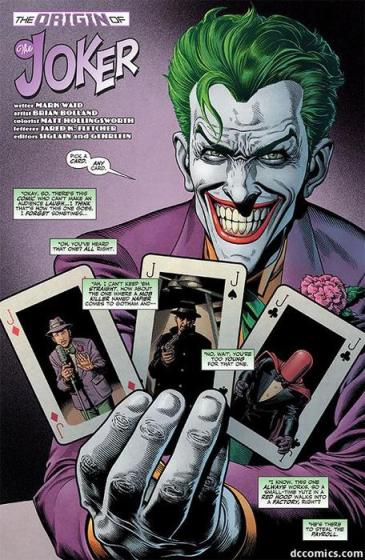by Jeremy DeFatta
Happy new book day, everyone! Building off last last week’s post, I want to lay down a few more of my thoughts on, and interpretations of, the Joker. These may seem a bit more convoluted than the last batch, but dedicating critical thought to the Joker is a deep, dark rabbit hole indeed. Let’s jump right in!
The white-skinned Joker can be seen as a ghost of his opposite number—Bruce Wayne. Though the connection is tenuous, I see it as a source of the animosity between the Joker and Batman. The Joker is the walking death of young Bruce Wayne grown to adulthood and spreading its pain across Gotham. After all, it is a fairly common idea that whatever was Bruce Wayne effectively died in that alleyway with his parents, leaving behind only a shell that wandered the world in search of answers until it finally became Batman. So, even if the Joker did not pull the trigger and kill the Waynes himself, he is a reminder—a ghost—from that night simply because of how well he represents the senselessness and cruelty that govern Batman’s city.
The Joker is the living symbol that Batman will constantly struggle against but never kill, not because of his code against killing, but because he fears what would fill the void left by the Joker’s passing. So long as the Joker is alive and Batman is fighting, there is hope in Bruce Wayne’s broken mind that things can be all right again.
That said, I believe there is some merit to the idea of Batman/order and the Joker/chaos as the opposing but essential poles of their world. Indeed, I believe that both are not only necessary, but valid. At their core, both characters are built upon existential horror. Batman is born in the realization of his own mortality, of seeing firsthand that material wealth cannot provide ultimate security, of seeing his world burned down.
The Joker, on the other hand, is born, effectively, of ignorance; we can never know his origin, because all of his power would disappear if we did. The horror is in the not knowing, and it is self-perpetuating. As such, it is the fear of death and the unknown. Batman is certainty; there is real evil in this world and it does not care who you are. The Joker is uncertainty; he is every person who has ever cried out to the universe demanding answers.
All of that, and the Joker is just a damned awesome villain. Please forgive me if any of this seems unnecessarily convoluted or (in and of itself) insane; thinking too long about the Joker has that effect. Let me know your thoughts and interpretations below. Tweet me @quaintjeremy.
My comic picks for this week:
Earth 2 #21
Forever Evil #6
Moon Knight #1
Velvet #4
Image © DC Comics; original artwork by Brian Bolland. Via Comicvine


He’s definitely my favorite.
LikeLiked by 1 person
Jokers are like bipolars😂laugh out n cry inside….love or hate the villain but can’t ignore them.Thank you for sharing your amazing thoughts:)
LikeLiked by 1 person
Reblogged this on quaintjeremy's thoughts and commented:
And here’s the second half of my Joker essay from the Batman column over at Sourcerer. Give it a look!
LikeLike
This is a fantastic analysis of the character. But in terms of why Batman will not kill the Joker, I think the rationale is based on his moral code against killing. Batman’s refusal to kill is the only thing that prevents him from becoming a villain who uses his power to maintain a distorted view of justice (Ra’s Al Guhl).
LikeLike
Pingback: Blogging A to Z Day 13: The Killing Joke | Sourcerer
Pingback: The Best Joker Yet! | Sourcerer